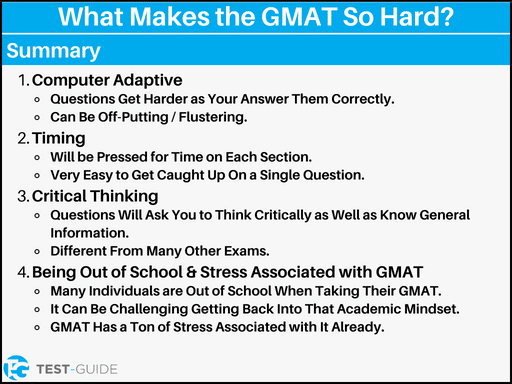Curious about how hard the GMAT is?
Without going into details, the GMAT is a very difficult exam. But why is it so hard? We will review the specific aspects that make the exam difficult below.
Is the GMAT Hard?
The GMAT is a challenging exam even though the format has recently changed (GMAT Focus exam). The exam is adaptive which means the questions get harder as you answer them correctly.
The adaptive nature of the exam makes the exam feel even more challenging, especially if you are answering questions correctly.
The GMAT examines a wide range of skills. Your math, reading, critical thinking, and critical reasoning skills will all be tested. In some cases, multiple skills will be tested on the same question.
You will not be able to focus your studies on one subject. You have to have a well-rounded understanding of many different topics and be able to apply them while taking the exam.
Bottom Line: Ask yourself how selective the program you’re trying to enter is. If you want to get into a top program that requires scores in the 90th percentile, (a score of 710 or higher out of 805) than you’re likely going to need to put in additional study time.
You can begin preparing by taking our free GMAT practice test.
What Makes the GMAT Hard?
There are many factors that make the GMAT hard. Some of the biggest factors include:
- Computer Adaptive
- Timing
- Critical Thinking
- Being Out of School & Stress Associated with the GMAT
1. Computer Adaptive
When taking the GMAT, you will find that some questions seem easier or harder than others. That is because the exam is computer adaptive.
As you answer questions correctly, they will become more challenging. This can be off-putting to some individuals and fluster them.
Because of this, your score does not depend on the number of questions you answered correctly. It is based off the number of questions you answered correctly and the difficulty of those questions.
In addition, you can only bookmark 3 questions per section (change 3 answers). Once you answer a question that is not bookmarked, you cannot return to it.
2. Timing
The GMAT recently underwent some changes. The exam is now 52 minutes shorter. However, this does not make the exam any easier.
You will be pressed for time on each section. Questions on this exam are tricky because they will require you to think critically while also answering them in a timely manner.
Many individuals will waste precious time just trying to understand the questions before answering them. The key to managing your time is keeping a strong pace.
You will have the following time limits for each section:
| Section | Minutes | Number of Questions | Minutes Per Question |
|---|---|---|---|
| Data Insights | 45 | 20 | 2:15 |
| Quantitative Reasoning | 45 | 21 | 2:09 |
| Verbal Reasoning | 45 | 23 | 1:57 |
3. Critical Thinking
There are 3 sections on the GMAT:
- Data Insights
- Quantitative Reasoning
- Verbal Reasoning
Each of these sections will ask questions that require you to know basic concepts (reading comprehension, math, etc…). However, each question will also require you to think critically.
What makes the GMAT so challenging is that the questions require you to apply 2 components:
- Knowledge Component
- Critical Thinking / Reasoning Component
This is different from a lot of exams you may have taken in the past. It can become very tiring as you progress through the exam and also ties into #2 (timing).
You can become more prepared for these questions by taking a GMAT practice test beforehand.
4. Being Out of School & Stress Associated with the GMAT
A lot of times, individuals who are taking the GMAT have been out of school for a couple of years. Once you get out of that academic mindset, standardized exams and studying can become very challenging.
In addition to being out of school, many individuals who are taking this exam are usually trying to juggle a job along with their studies. This can make it hard to get focused study time in and can become very stressful.
Lastly, the GMAT in general has a lot of stress associated with it. For many, a high score on this exam is the difference between getting into the MBA or graduate program of their choice. That kind of stress can really weigh on you when studying and taking the actual exam.
You can combat all of this by focusing on getting back into that academic mindset. Try to set a study schedule to help get back into the swing of things.

Tips for Making the GMAT Easier
The GMAT does not have to be challenging. We have listed some tips you can use to make the GMAT a little easier:
- Take Practice Exams
- Invest In the Right Prep Materials
- Give Yourself Enough Time to Study
- Become Familiar with the Exam
1. Take Practice Exams
Taking practice exams is our #1 recommended tip to doing well on this exam. The questions asked are so different from questions on other standardized exams.
Taking a practice exam will help you learn how the questions are asked, the amount of time you can spend on each question, and how to answer the questions.
In addition, you can also review your score reports to see which sections you struggled on the most. This will help you narrow down your studies and study in a more efficient manner.
You can get started by taking our free GMAT practice test.
2. Invest in the Right Prep Materials
It is important to invest in the right prep materials. Some students may not need to invest in anything and can self-study.
Other students may prefer to learn via online lectures, videos, or textbooks. The most important thing is to invest in a resource that fits your specific needs.
This will help you save precious study time and increase your chances of doing well on this difficult exam. You can review the different options by checking out our list of best GMAT prep courses.
3. Give Yourself Enough Time to Study
If you have to cram for an exam, odds are you will not do well. The GMAT has exam dates year-round, so there is no reason you should have to cram.
It is generally recommended that you give yourself 2-3 months to prepare for your exam. However, everyone is different.
Review our GMAT test dates article for more information on how to pick a test date and what to consider when doing so.
4. Become Familiar with the Exam
Becoming familiar with the exam can help you with your test-day anxiety. If you know what to expect, and are comfortable with the exam, you should not be as anxious on test day.
You can use practice tests and your study resources to become familiar with this exam inside and out. You should know exactly what to expect before going in to take your exam.
Make sure you are comfortable with the following:
- Types of Questions Asked
- Time You Can Spend Per Question
- Trick Questions and Types of Questions that Specifically Give You Problems
If you are aware of those 3 things, you should be on the right path to getting a good score.
How Hard is it to Pass the GMAT?
Technically, there is not a passing score for the GMAT. With that being said, the higher the score you get, the better your chances will be of getting into a top MBA or graduate program.
We have listed some percentiles for the GMAT below. A 50th percentile score means you scored the same as 50% of test-takers.
- 800 = 99th
- 700 = 88th
- 600 = 56th
- 500 = 27th
- 400 = 10th
- 300 = 3rd
For more information on scores, read our guide on good GMAT scores.
Frequently Asked Questions
Is the GMAT Focus exam easier than the traditional GMAT?
In Febraury 2024, the traditional GMAT is being retired. The GMAT Focus exam is taking its place.
The GMAT Focus will be more streamlined and only include 3 sections. The GMAT Focus will only take 2 hours and 15 minutes to complete versus the 3 hours and 7 minutes the traditional GMAT took.
However, the Focus version of the exam is not easier. The exam is very similar, it just is more streamlined and does not include an essay section.
Can you retake the GMAT if you do not do well?
You can retake the GMAT up to 8 times in your life. However, you can only take it 5 times in a calendar year, and you must wait 16 days between retakes.
Do a lot of individuals struggle with the GMAT?
Many individuals struggle with the GMAT. The exam is very challenging and gives many people trouble.
Individuals who go into the exam unprepared will struggle the most. The best thing you can do for this exam is prepare properly. Use the resources and tips provided above to help prepare and make the GMAT easier.

